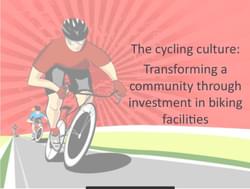




How They are Realizing the Benefits of Improved Health and Economic Development
This session will highlight how Garver Engineering transformed its wellness program to improve overall health while reducing company healthcare costs.

Speakers: Matt Mihalevich, Trails Coordinator, City of Fayetteville; Robert Voyles, Director of Planning, City of North Little Rock
This session will demonstrate the process the City of Fayetteville has developed to efficiently build trails utilizing in-house city workers to reduce costs and accelerate construction. Evaluation of the positive economic impacts of Fayetteville’s premier urban trail, Scull Creek Trail, including increased property values, reduced crime, and vacancy rates will be assessed. The focus will then shift to the North Little Rock portion of the central Arkansas River Trail, completed in 2006, and the Big Dam Bridge, completed in 2009, providing an essential link to Little Rock’s trails. The Arkansas River Trail caused several businesses to locate near the trail. This session will highlight how Garver Engineering transformed its wellness program to improve overall health while reducing company healthcare costs.